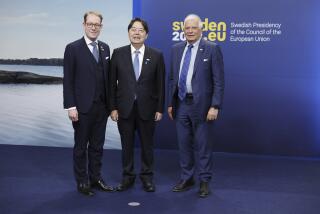Re-Asianization Does Not Mean Isolation : Trade: Japan should strengthen ties with its neighbors, while maintaining good relations with the West.
- Share via
TOKYO — Since the Meiji Restoration in the late 1800s, progress in Japan has been guided by an official policy of de-Asianization and pro-Westernization. Adhering to this policy seemed a rational and natural course, as Japan was driven to develop its technology and economy in order to take its place among advanced nations of the West.
Yet Japan’s single-minded drive for modernization took place at the expense of something very significant--the friendship and trust of other Asian nations.
Today, Japan should be pursuing a path of “re-Asianization.” This term may easily conjure up an image of Japan isolating itself within the boundaries of Asia, or placing itself at the center of Asia by dominating other countries in the region. This is not the case. The re-Asianization I am promoting is not exclusive. Rather, it involves strengthening ties in Asia, while at the same time maintaining close relations with the West.
Japan has at times displayed a lack of sensitivity to the voices of other Asian nations, as demonstrated recently by renewed controversies involving how Japanese textbooks address World War II. Yet this cannot overshadow Japan’s strong relationship with Asia, exemplified by the large volume of official development aid provided to Asian countries, which surpassed $4 billion in 1990, or nearly 60% of total Japanese foreign assistance.
Malaysian Prime Minister Mahathir Mohammed has advanced the concept of an East Asia Economic Group (EAEG). Behind his proposal are two impending global economic moves: market unification of the European Community in 1992 and the expected formation of the North American free trade area, a U.S.-led bloc designed to compete with the EC.
Mohammed’s proposal implies that it is better for a stable world economy to have three economic blocs than two and, because East Asia is fast becoming a sizeable economic and technological entity, some sort of formal regionalization is warranted.
As a leading nation in Asia, Japan should support the EAEG if its goal is not to create an exclusive trading bloc, but rather to promote global trade and investment with the region, and if such a proposal is not in conflict with the spirit and letter of the General Agreement on Tariffs and Trade.
Naturally, Japan’s enormous economic and industrial strength may serve as a barrier to making positive moves in the region. Increased Japanese activity may stir up bitter memories of the prewar “Greater East-Asia Co-Prosperity Sphere.” Some may fear that Japan is on its way to reviving the aggression displayed before and during World War II.
Generally speaking, however, today’s political and business leaders elsewhere in Asia are comparatively much younger than their counterparts in Japan. This may mean that there are fewer people who look at Japan with the unabated suspicion caused by the pain they or their forefathers suffered from past Japanese actions.
This does not give Japan free license to conduct unrestrained economic and industrial activities in Asia, even though the world community is demanding that Japan take a more active “leadership role” in the international arena. This matter of leadership must evolve only after winning the consent and support of other nations, particularly neighboring nations.
It does not seem wise for Japan to be the sole leader in Asia. In this regard, China’s immense presence in the region must not be overlooked. China was not only on the winning side after World War II, it is also a permanent member of the U.N. Security Council. It is prudent for Japan to cooperate with China as more-or-less co-chairs in contributing to the development of Asia. This would mitigate the distrust that Asian neighbors may continue to harbor toward Japan.
However, Japanese progress in Asia would be problematic without support from America. Therefore, it is vital that Japan accompany its efforts toward Asia with comparable efforts toward the United States.
Last January, at an international meeting in the United States, attended by such distinguished figures as Gerald Ford, Paul Volker, Valery Giscard d’Estaing and Helmut Schmidt, a statement was made that by the year 2015, Japan would become as large as the United States in terms of gross national product.
I was stunned by vehement counter-arguments from Western leaders that Japan could never become so considerable in terms of GNP. Rather, they said, Japan was facing difficult problems both at home and abroad, and its progress would consequently be hindered. I could not help but wonder if maintaining its pace of progress would cost Japan its friends in the international community. To the rest of the world, is Japan’s growth acceptable only to a certain degree?
The Japanese people cannot afford to ignore the fact that there are still people in the West who feel uncomfortable about Japan’s continued growth and development. Mindful of this distrust, I nonetheless believe that the time will come when the world will not only expect Japan to assume a leadership role, but will also feel comfortable with it. Japan must persevere until that moment arrives.
More to Read
Sign up for Essential California
The most important California stories and recommendations in your inbox every morning.
You may occasionally receive promotional content from the Los Angeles Times.










